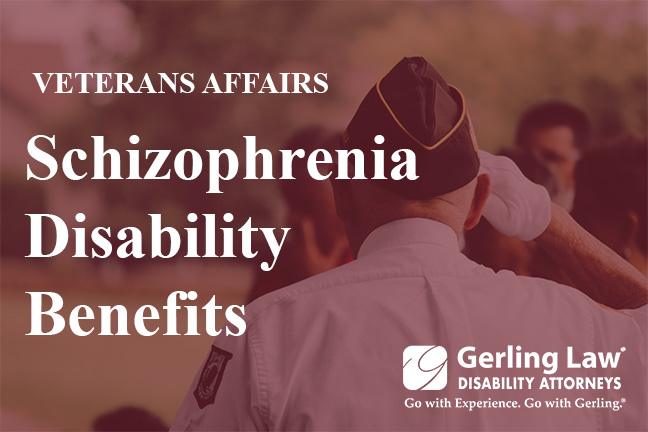
People with schizophrenia typically find it hard to manage their emotions, think straight, make decisions, and relate to other people. Handling daily life tasks can be challenging for some people with schizophrenia. Understandably, you might be looking into governmental programs and disability options.
If your schizophrenia disability is related to your military service, you could be eligible to receive benefits through the VA. To learn more about veterans’ schizophrenia claims, contact the knowledgeable VA disability benefits lawyers at Gerling Law Disability Attorneys today.
Schizophrenia Symptoms
People who have schizophrenia may have different symptoms—no two people’s experiences are exactly alike. Some of the most common signs of schizophrenia include:
- Difficulty expressing or feeling emotions;
- Difficulty paying attention or concentrating;
- Trouble with slow thinking or memory loss;
- Hallucinations;
- Reduced emotional expressions, such as limited eye contact or facial expressions;
- Delusions that can include feeling like you’re being followed or watched when you aren’t;
- Confused thinking; and
- Struggles with getting out of the house, pursuing goals, attending school, doing things with other people, etc.
If you suspect you have schizophrenia and haven’t been diagnosed, you need to seek treatment with a medical professional who can accurately diagnose you. Symptoms can resemble other mental health conditions, so you need to know what you’re dealing with before filing a VA disability benefits schizophrenia claim.
How Veterans Affairs Disability Schizophrenia Claims Work
If you believe your schizophrenia was exacerbated by your time in the military, you must show you have a current diagnosis and that your condition is connected to your military service. Schizophrenia can often be linked to military service if your delusions developed as a result of a specific event during your military service—for example, a highly stressful or traumatic experience, such as a combat mission. If you can prove those elements, the VA will assign a disability rating that reflects your condition’s severity.
Several different conditions are commonly associated with schizophrenia. These conditions are:
- Major Depressive Order: Depression is a common problem for those with schizophrenia.
- Diabetes Mellitus: Those who have schizophrenia are more likely to have diabetes as well, typically because of a lack of exercise, poor diet, and antipsychotic drugs that can cause obesity.
- Cardiovascular Disease: Anxiety, obesity, and depression all contribute to cardiovascular disease as well.
In some cases, you may have a situation that involves more than one condition. If you can prove you have a secondary condition that is service connected, the VA could increase your VA disability benefits rating.
Your Schizophrenia Disability Benefits Rating
If you are eligible for benefits, the VA will assign you a disability rating. For mental health conditions, the ratings are fixed at 10%, 30%, 50%, 70%, or 100%. Here are the characteristics of each rating level:
- 10%: Your symptoms are sporadic or transient, and medication likely controls symptoms.
- 30%: This disability rating applies to veterans who also suffer from symptoms of depressed mood, chronic sleep impairment, anxiety, mild memory loss, occasional difficulties at work, and panic attacks that occur weekly or less often than weekly. You function at a satisfactory level but might have some instances where schizophrenia interferes with job performance or your social interactions.
- 50%: A rating of 50% is assigned if your symptoms include panic attacks that occur more than once per week, difficulty with short and long term memory, disturbances in motivation and mood, and difficulty in establishing and maintaining work and/or social relationships
- 70%: Veterans at this disability benefit rating level struggle to find work, and they may have near-continuous recurring panic attacks, neglect of personal hygiene, inability to manage stressful situations, and possibly suicidal thoughts.
- 100%: For a veteran to receive a 100% disability benefits rating, they may require constant supervision and have difficulties leaving their home. This rating applies to veterans who cannot work, have symptoms of delusions or hallucinations, have severe memory loss such as forgetting names of close relatives, grossly inappropriate behavior, and inability to perform activities of daily living.
There is a chance the VA could award you a 0% rating, which confirms you have a formal diagnosis but your symptoms aren’t severe enough to interfere with your social interactions or job performance, or you don’t need continuous medication.
Contact a Schizophrenia VA Disability Benefits Lawyer
If you believe you have a service-connected mental health condition like schizophrenia, it’s crucial to speak with a knowledgeable attorney who can help you file a claim. The VA claims process can be daunting, and it’s not uncommon to have your initial application denied or to receive a low VA disability benefits rating.
At Gerling Law Disability Attorneys, we have over five decades of experience helping thousands of clients with legal claims. Contact our Nationwide VA Disability Benefits law firm today to learn more about how we can help. Don’t wait until you have to file an appeal before getting help. We can improve your chances of receiving a VA disability benefits rating on your initial application. Remember, Go with Experience. Go with Gerling ®.